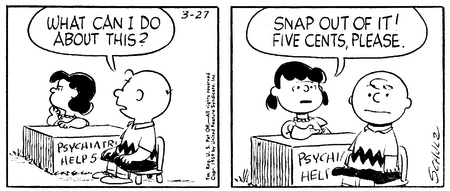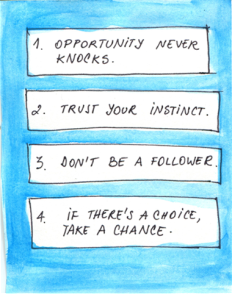By: Chris Warren.
The other night I was on the phone with a buddy I’ve kicked it around with since we were young brats. We are still close friends and we sometimes get carried away while shooting the breeze and yapping about whatever. What started as a five minute check-in call turned into a lengthy introspective. It was a sometimes serious, mostly funny conversation, contemplating what advice we would give our seventeen year old selves. As it turns out, it’s not really an original idea.
If I were having a face to face talk with my seventeen year old self, the list of advice would be far longer than can be fit into a few hundred words on a commentary blog. But there are two Big Things old Chris wants young Chris to know:
“First, you somehow got it in your head that you have to go it alone on everything, but there are a lot of people on your side, and letting them in, even just a little, would make your world a lot better. There is no shame in asking for help, nor is there any particular glory in struggling by yourself. Decades from now you will still be doing everything yourself, but by then you will have become a very resourceful person and learned to work it to your advantage.
“Second, take yourself less seriously: You brood over inconsequential junk that you’ll barely remember five years from now. I understand that friends, school, and life seem very heavy to you. It may shock you to hear me say this, but the world you are in now, the one that gives you so much stress, is not reality. It’s not even close. Everything gets harder from here. Your life will never be as easy as it is at seventeen. Toughen up and stop thinking that no one has bigger problems than yours. Not everyone who superficially treats you well is your friend, and not everyone who kicks you in the balls is your enemy. Learn the difference. If you can’t handle your present day problems, then there is no advice that will save you from becoming hopelessly dysfunctional as an adult.”
Today I hear young people say stuff that sounds amazingly similar to things I said and felt myself when I was in their shoes. In their limited life experience, their problems seem very real. I feel a responsibility to help them gain some perspective and make them see that these things do pass.
One of the worst things an adult can do is trivialize a kid’s problem, even if the problem is, in fact, trivial. Yes, I get it: Breaking up with a girl/boyfriend after a two month “relationship”, or not making the team, or not having a date for the dance, or not getting cool new clothes don’t rank high as the most profound concerns in the world, unless of course your world is not that big to begin with. That is the viewpoint teens see things from. My advice to my seventeen year old self was to take myself less seriously. The advice goes the other way for the adults: Take kids’ concerns more seriously, because to them, making the team, or whatever, is a pretty big deal.
When I think back to those times I am somewhat embarrassed about how much I used to let trivial things bother me. I am certain that pretty much everyone my age feels the same way. If we all had the benefit of our adult selves counseling our teenaged selves, would we follow our own advice? I don’t think I would have listened. The paradox is that had I listened to my own advice, I would have missed out on the failures that resulted in the life experience that allowed me to give the advice in the first place. As the cliché goes, no pain no gain, at least until someone discovers time travel. My seventeen year old self will just have to accept the growing pains and wait a few more decades to see that my older self was right about everything.



